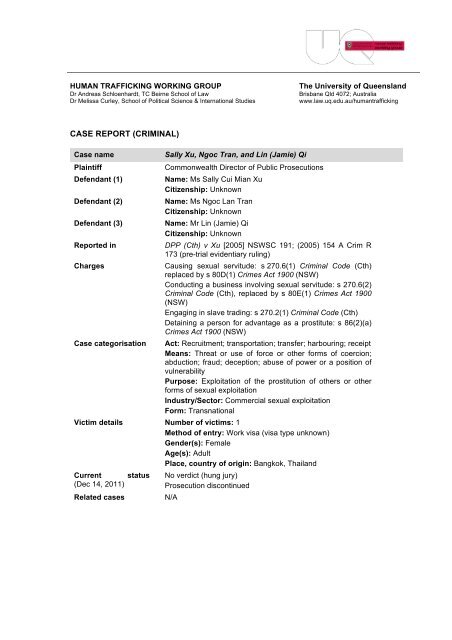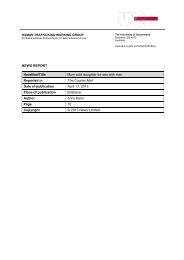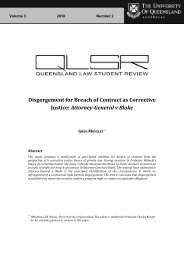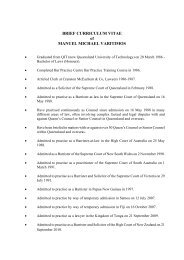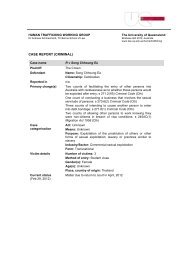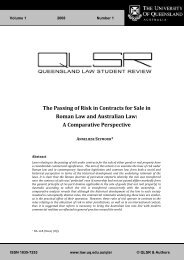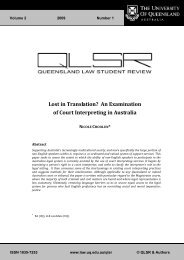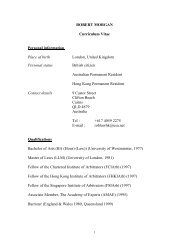CASE REPORT (CRIMINAL) - TC Beirne School of Law - University ...
CASE REPORT (CRIMINAL) - TC Beirne School of Law - University ...
CASE REPORT (CRIMINAL) - TC Beirne School of Law - University ...
Create successful ePaper yourself
Turn your PDF publications into a flip-book with our unique Google optimized e-Paper software.
HUMAN TRAFFICKING WORKING GROUP<br />
Dr Andreas Schloenhardt, <strong>TC</strong> <strong>Beirne</strong> <strong>School</strong> <strong>of</strong> <strong>Law</strong><br />
Dr Melissa Curley, <strong>School</strong> <strong>of</strong> Political Science & International Studies<br />
<strong>CASE</strong> <strong>REPORT</strong> (<strong>CRIMINAL</strong>)<br />
Case name Sally Xu, Ngoc Tran, and Lin (Jamie) Qi<br />
Plaintiff Commonwealth Director <strong>of</strong> Public Prosecutions<br />
Defendant (1) Name: Ms Sally Cui Mian Xu<br />
Citizenship: Unknown<br />
Defendant (2) Name: Ms Ngoc Lan Tran<br />
Citizenship: Unknown<br />
Defendant (3) Name: Mr Lin (Jamie) Qi<br />
Citizenship: Unknown<br />
The <strong>University</strong> <strong>of</strong> Queensland<br />
Brisbane Qld 4072; Australia<br />
www.law.uq.edu.au/humantrafficking<br />
Reported in DPP (Cth) v Xu [2005] NSWSC 191; (2005) 154 A Crim R<br />
173 (pre-trial evidentiary ruling)<br />
Charges Causing sexual servitude: s 270.6(1) Criminal Code (Cth)<br />
replaced by s 80D(1) Crimes Act 1900 (NSW)<br />
Conducting a business involving sexual servitude: s 270.6(2)<br />
Criminal Code (Cth), replaced by s 80E(1) Crimes Act 1900<br />
(NSW)<br />
Engaging in slave trading: s 270.2(1) Criminal Code (Cth)<br />
Detaining a person for advantage as a prostitute: s 86(2)(a)<br />
Crimes Act 1900 (NSW)<br />
Case categorisation Act: Recruitment; transportation; transfer; harbouring; receipt<br />
Means: Threat or use <strong>of</strong> force or other forms <strong>of</strong> coercion;<br />
abduction; fraud; deception; abuse <strong>of</strong> power or a position <strong>of</strong><br />
vulnerability<br />
Purpose: Exploitation <strong>of</strong> the prostitution <strong>of</strong> others or other<br />
forms <strong>of</strong> sexual exploitation<br />
Industry/Sector: Commercial sexual exploitation<br />
Form: Transnational<br />
Victim details Number <strong>of</strong> victims: 1<br />
Method <strong>of</strong> entry: Work visa (visa type unknown)<br />
Gender(s): Female<br />
Age(s): Adult<br />
Place, country <strong>of</strong> origin: Bangkok, Thailand<br />
Current status<br />
(Dec 14, 2011)<br />
Related cases N/A<br />
No verdict (hung jury)<br />
Prosecution discontinued
Facts and Background<br />
Date(s) <strong>of</strong> <strong>of</strong>fending December 2002 – January 5, 2003<br />
Location(s) Marrickville, Homebush, Ryde, and Rozelle (NSW)<br />
The case against Sydney brothel owners Ms Sally Ciu Mian Xu, Ms Ngoc Lan Tran, and<br />
their co-accused, brothel manager Mr Lin Qi involved a 22-year old Thai woman (Ms K)<br />
who was allegedly brought from Thailand to Australia and forced to work in a brothel<br />
against her will. 1<br />
Ms K later testified that she was a law student in Bangkok when she was promised<br />
waitressing work in a Thai restaurant in Australia. It was alleged that her airfare to<br />
Australia was paid and a visa organised, and that a female ‘minder’ from Bangkok<br />
accompanied her to Sydney. 2 When she arrived in Australia on December 21, 2002, she<br />
was allegedly forced to work in Ms Tran’s brothel in Annandale, Sydney. 3 Ms K’s passport<br />
was confiscated and she was then told that she owed a debt to the brothel owners, which<br />
was to be worked <strong>of</strong>f through the performance <strong>of</strong> twenty sex acts a day.<br />
In the subsequent days she threatened to kill herself and ‘begged a customer for help’. 4<br />
Ms Tran then sold her to Ms Xu, also a brothel owner in Sydney. Ms K gave evidence<br />
that she was forced to work daily at Xu's brothels at Marrickville, Homebush, Ryde, and<br />
Rozelle. She said she was given $20 by Xu to pay for her food. 5 When not at work she<br />
slept at a secured house with fourteen other girls. It was alleged that she was forced to<br />
crawl through a hole in the wall from the brothel to reach the house. 6 There was also<br />
evidence given that Ms K was threatened with what she thought was a baseball bat. 7<br />
The case came to the attention <strong>of</strong> the authorities on January 5, 2003, after Ms K borrowed<br />
a telephone from the reception Ms Xu’s brothel in Rozelle, where Mr Qi was the<br />
receptionist. Ms K hid in a toilet cubicle and called 000. 8<br />
Ms Xu and Ms Tran were subsequently arrested and charged with <strong>of</strong>fences relating to<br />
causing sexual servitude, conducting a business involving sexual servitude, engaging in<br />
slave trading, and detaining a person for advantage as a prostitute. Mr Qi was charged<br />
with the same <strong>of</strong>fences but not for the <strong>of</strong>fence <strong>of</strong> engaging in slave trading. Initial charges<br />
under the Criminal Code (Cth) were later retracted and replaced with their equivalent<br />
<strong>of</strong>fences under the Crimes Act 1900 (NSW). 9<br />
Prior to the trial, on May 13, 2004, Ms Xu made an application to the Supreme Court <strong>of</strong><br />
New South Wales to challenge a restraint order, previously granted to the Director <strong>of</strong><br />
Public Prosecutions, in relation to her property and a sworn statement she made setting<br />
out the particulars <strong>of</strong> her dealings with that property. It was common ground that an issue<br />
at the defendant’s trial would be her connection, or otherwise, with premises alleged to<br />
have been the location <strong>of</strong> the <strong>of</strong>fences. Ms Xu attempted to argue that the original order<br />
1 Commonwealth Director <strong>of</strong> Public Prosecutions, Annual Report 2004-05 (2005) 105.<br />
2 Commonwealth Director <strong>of</strong> Public Prosecutions, Annual Report 2004-05 (2005) 105.<br />
3 ‘Hung jury in ‘sex slave’ case’ (26 May 2005) The Sydney Morning Herald.<br />
4 ‘Hung jury in ‘sex slave’ case’ (26 May 2005) The Sydney Morning Herald.<br />
5 ‘Hung jury in ‘sex slave’ case’ (26 May 2005) The Sydney Morning Herald.<br />
6 Australia, Anti–People Trafficking Interdepartmental Committee, Trafficking in Persons: The<br />
Australian Government’s Response January 2004–April 2009 (2009) 72.<br />
7 Australia, Anti–People Trafficking Interdepartmental Committee, Trafficking in Persons: The<br />
Australian Government’s Response January 2004–April 2009 (2009) 72.<br />
8 ‘Hung jury in ‘sex slave’ case’ (26 May 2005) The Sydney Morning Herald.<br />
9 Section 80D(1) Crimes Act 1900 (NSW) (replacing s 270.6(1) Criminal Code (Cth)); s 80E(1)<br />
Crimes Act 1900 (NSW) (replacing s 270.6(s) Criminal Code (Cth)).<br />
2
and sworn statement should be vacated until after the trial on the grounds that it would<br />
infringe on her fundamental common law privilege against self-incrimination. The<br />
application was, however, dismissed: DPP (Cth) v Xu [2005] NSWSC 191; (2005) 154 A Crim<br />
R 173.<br />
First Trial<br />
Court New South Wales District Court<br />
Citation Unreported<br />
Trial judge Judge Anthony Blackmore<br />
Important dates Trial: March 22, 2005 - May 26, 2005<br />
Defendant (1)<br />
Ms Sally Cui Mian Xu<br />
Defendant (2)<br />
Ms Ngoc Lan Tran<br />
Defendant (3)<br />
Mr Lin (Jamie) Qi<br />
Charge 1: Causing sexual servitude: s 270.6(1) Criminal<br />
Code (Cth), replaced by s 80D(1) Crimes Act 1900<br />
Plea: Not guilty<br />
Verdict: No verdict<br />
Charge 1: Conduct <strong>of</strong> a business involving sexual servitude:<br />
s 270.6(2) Criminal Code (Cth), replaced by s 80E(1) Crimes<br />
Act 1900 (NSW)<br />
Plea: Not guilty<br />
Verdict: No verdict<br />
Charge 2: Engaging in slave trading: s 270.2(1) Criminal<br />
Code (Cth)<br />
Plea: Not guilty<br />
Verdict: Not guilty<br />
Charge 3: Detaining a person for advantage as a prostitute: s<br />
86(2)(a) Crimes Act 1900 (NSW)<br />
Plea: Not guilty<br />
Verdict: No verdict<br />
Charge 1: Causing sexual servitude: s 270.6(1) Criminal<br />
Code (Cth), replaced by s 80D(1) Crimes Act 1900 (NSW)<br />
Plea: Not guilty<br />
Verdict: No verdict<br />
Charge 2: Conducting a business involving sexual servitude:<br />
s 270.6(2) Criminal Code (Cth), replaced by s 80E(1) Crimes<br />
Act 1900 (NSW)<br />
Plea: Not guilty<br />
Verdict: No verdict<br />
Charge 3: Engaging in slave trading: s 270.2(1) Criminal<br />
Code (Cth)<br />
Plea: Not guilty<br />
Verdict: No verdict<br />
Charge 4: Detaining a person for advantage as a prostitute:<br />
s 86(2)(a) Crimes Act 1900 (NSW)<br />
Plea: Not guilty<br />
Verdict: No verdict<br />
Charge 1: Causing sexual servitude: s 270.6(1) Criminal<br />
Code (Cth), replaced by s 80D(1) Crimes Act 1900<br />
3
Sentence N/A<br />
Plea: Not guilty<br />
Verdict: No verdict<br />
Charge 2: Conduct <strong>of</strong> a business involving sexual servitude:<br />
s 270.6(2) Criminal Code (Cth), replaced by s 80E(1) Crimes<br />
Act 1900 (NSW)<br />
Plea: Not guilty<br />
Verdict: No verdict<br />
Charge 3: Detaining a person for advantage as a prostitute:<br />
s 86(2)(a) Crimes Act 1900 (NSW)<br />
Plea: Not guilty<br />
Verdict: No verdict<br />
In April 2005, following nine weeks <strong>of</strong> evidence in the District Court <strong>of</strong> New South Wales,<br />
the jury deliberated for two days before acquitting Ms Xu <strong>of</strong> the slave-trading charge. The<br />
jury was not able to reach a verdict on the other charges against any <strong>of</strong> the defendants.<br />
Ms K, the main witness, endured eleven days <strong>of</strong> testimony, including six days <strong>of</strong> vigorous<br />
cross-examination where she was portrayed by the defence as a willing sex worker, who<br />
was bringing the charges due to her anger at not earning more money. 10 After the trial,<br />
Ms K returned to Thailand and indicated that she would not be willing to testify in a<br />
subsequent retrial given the trauma experienced in the first trial. 11 Without her evidence,<br />
the prosecution was unable to proceed to a retrial. 12<br />
10 Commonwealth Director <strong>of</strong> Public Prosecutions, Annual Report 2004-05 (2005) 105.<br />
11 Fiona David, ‘Prosecuting trafficking in persons: known issues, emerging response’,<br />
Australian Institute for Criminology, Trends and Issues in Criminal Justice, No 358, June<br />
2008, 3.<br />
12 Commonwealth Director <strong>of</strong> Public Prosecutions, Annual Report 2004-05 (2005) 106.<br />
4
Analysis and Comment<br />
A number <strong>of</strong> sources cite this case as an illustration <strong>of</strong> how a trafficking victim is central to<br />
successful prosecutions for trafficking in persons and how victims <strong>of</strong>ten significantly suffer<br />
during trial as their credibility is vigorously tested by defence counsel. 13<br />
Fiona David, referring to transcripts <strong>of</strong> the trial, notes that:<br />
Ms K was questioned about what she wore on particular days, her prior sexual history,<br />
which ‘clients’ she had sex with in Australia and what this involved. She had to respond to<br />
repeated questions that suggested she was a liar, that she just wanted a visa and that she<br />
really wanted to marry an Australian man so she could remain in Australia. Defence<br />
counsel brought various men, whom they alleged were former clients, into the courtroom<br />
and asked her to identify them. Throughout her evidence, she sat in open court with the<br />
three co-defendants. 14<br />
David also highlights how prior inconsistent statements made by the victims can lead to<br />
them being accused <strong>of</strong> fabricating their story:<br />
In the Tran, Xu & Qi case, defence counsel suggested that Ms K had fabricated her story<br />
so she would not be deported from Australia, and that she had collected telephone<br />
numbers from her clients in the hope they would marry her so she could remain in<br />
Australia. In this case, the prosecutor was able to lead evidence from Ms K that she had<br />
actively sought to return home after being detected by the police, even though she was told<br />
she might be eligible for a visa to remain in Australia (transcript <strong>of</strong> R v Tran, Xu & Qi, 8<br />
April 2005). The likely need to rebut attacks on the alleged victim’s credibility underscores<br />
the important role <strong>of</strong> corroborative evidence. 15<br />
It was stated in 2009 by the Anti–People Trafficking Interdepartmental Committee that at<br />
the<br />
National Roundtable on People Trafficking in June 2008, participants identified training for<br />
legal practitioners and jurors on trafficking issues as an initiative which may improve the<br />
experience <strong>of</strong> victims <strong>of</strong> trafficking who choose to give evidence in court proceedings. The<br />
Attorney-General’s Department is currently working with the National Judicial College <strong>of</strong><br />
Australia to develop additional education resources for judges on people trafficking. 16<br />
13 See, Australia, Anti–People Trafficking Interdepartmental Committee, Trafficking in Persons:<br />
The Australian Government’s Response January 2004–April 2009 (2009) 24–25; Fiona<br />
David, ‘Trafficking for Sexual Purposes’, Research and Public Policy Series, No 95 (2008)<br />
50–51; Fiona David, ‘Prosecuting trafficking in persons: known issues, emerging response’,<br />
Trends and Issues in Criminal Justice, No 358, June 2008, 3–4.<br />
14 Fiona David, ‘Prosecuting trafficking in persons: known issues, emerging response’, Trends<br />
and Issues in Criminal Justice, No 358, June 2008, 3.<br />
15 Ibid, 4.<br />
16 Australia, Anti–People Trafficking Interdepartmental Committee, Trafficking in Persons: The<br />
Australian Government’s Response January 2004–April 2009 (2009) 5.<br />
5
List <strong>of</strong> references<br />
Official case reports<br />
DPP (Cth) v Xu [2005] NSWSC 191, (2005) 154 A Crim R 173<br />
Secondary sources<br />
Australia, Anti–People Trafficking Interdepartmental Committee, Trafficking in Persons: The<br />
Australian Government’s Response January 2004–April 2009, Canberra, ACT:<br />
Commonwealth <strong>of</strong> Australia, 2009.<br />
Commonwealth Director <strong>of</strong> Public Prosecutions, Annual Report 2004-05 (2005) 105 – 106.<br />
David, Fiona, ‘Prosecuting trafficking in persons: known issues, emerging response’, Trends and<br />
Issues in Criminal Justice, No 358, Canberra, ACT: Australian Institute <strong>of</strong> Criminology June<br />
2008.<br />
David, Fiona, ‘Trafficking for Sexual Purposes’, Research and Public Policy Series, No 95,<br />
Canberra, ACT: Australian Institute <strong>of</strong> Criminology, 2008.<br />
Davies, Lisa, ‘Prostitute supports That “sex-slave” claims’ (21 April 2005) The Daily Telegraph<br />
(Sydney) 22.<br />
Hung jury in “sex slave” case’ (26 May 2005) The Sydney Morning Herald,<br />
<br />
Schloenhardt, Andreas et al, ‘Human Trafficking and Sexual Servitude in Australia’ (2009) 32(1)<br />
<strong>University</strong> <strong>of</strong> New South Wales <strong>Law</strong> Journal 27.<br />
Schloenhardt, Andreas et al, ‘Trafficking in Persons in Australia: Myths and Realities’ (2009)<br />
10(3) Global Crime 224.<br />
© 2011, The <strong>University</strong> <strong>of</strong> Queensland, Human Trafficking Working Group.<br />
An electronic copy <strong>of</strong> this document is available at www.law.uq.edu.au/humantrafficking.<br />
6


